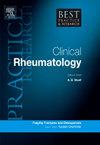多基因风险评分在风湿病诊断中的应用。
IF 4.8
2区 医学
Q1 RHEUMATOLOGY
Best Practice & Research in Clinical Rheumatology
Pub Date : 2024-12-01
DOI:10.1016/j.berh.2024.101973
引用次数: 0
摘要
风湿性疾病(RDs)以自身免疫和自身炎症为特征,其发病机制因多种遗传、环境和生活方式因素的相互作用而变得复杂。随着全基因组关联研究(GWAS)的迅速发展,人们发现了许多与 RD 易感性相关的单核苷酸多态性(SNPs)。基于这些 SNPs,多基因风险评分(PRSs)已成为量化该疾病群体遗传风险的有效工具。本章回顾了多基因风险评分在评估 RD 风险方面的现状,并讨论了多基因风险评分通过区分不同 RD 的能力来提高这些复杂疾病诊断准确性的潜力。PRS 对各种 RD 具有很高的鉴别能力,并显示出潜在的临床实用性。随着全球基因组研究的不断发展,PRSs有望通过整合遗传、环境和生活方式因素实现更精确的风险分层,从而完善个体风险预测并推进疾病管理策略。本文章由计算机程序翻译,如有差异,请以英文原文为准。
Utility of polygenic risk scores to aid in the diagnosis of rheumatic diseases
Rheumatic diseases (RDs) are characterized by autoimmunity and autoinflammation and are recognized as complex due to the interplay of multiple genetic, environmental, and lifestyle factors in their pathogenesis. The rapid advancement of genome-wide association studies (GWASs) has enabled the identification of numerous single nucleotide polymorphisms (SNPs) associated with RD susceptibility. Based on these SNPs, polygenic risk scores (PRSs) have emerged as promising tools for quantifying genetic risk in this disease group. This chapter reviews the current status of PRSs in assessing the risk of RDs and discusses their potential to improve the accuracy of the diagnosis of these complex diseases through their ability to discriminate among different RDs. PRSs demonstrate a high discriminatory capacity for various RDs and show potential clinical utility. As GWASs continue to evolve, PRSs are expected to enable more precise risk stratification by integrating genetic, environmental, and lifestyle factors, thereby refining individual risk predictions and advancing disease management strategies.
求助全文
通过发布文献求助,成功后即可免费获取论文全文。
去求助
来源期刊
CiteScore
9.40
自引率
0.00%
发文量
43
审稿时长
27 days
期刊介绍:
Evidence-based updates of best clinical practice across the spectrum of musculoskeletal conditions.
Best Practice & Research: Clinical Rheumatology keeps the clinician or trainee informed of the latest developments and current recommended practice in the rapidly advancing fields of musculoskeletal conditions and science.
The series provides a continuous update of current clinical practice. It is a topical serial publication that covers the spectrum of musculoskeletal conditions in a 4-year cycle. Each topic-based issue contains around 200 pages of practical, evidence-based review articles, which integrate the results from the latest original research with current clinical practice and thinking to provide a continuous update.
Each issue follows a problem-orientated approach that focuses on the key questions to be addressed, clearly defining what is known and not known. The review articles seek to address the clinical issues of diagnosis, treatment and patient management. Management is described in practical terms so that it can be applied to the individual patient. The serial is aimed at the physician in both practice and training.

 求助内容:
求助内容: 应助结果提醒方式:
应助结果提醒方式:


